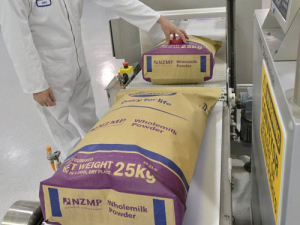Two new awards open to help young farmers progress to farm ownership
Entries have opened for two awards in the New Zealand Dairy Industry Awards (NZDIA) programme, aimed at helping young farmers progress to farm ownership.
 A fall of 3.4% in the overall GDT Event price index last week was the fourth consecutive fall and prices are now at eight-month lows.
A fall of 3.4% in the overall GDT Event price index last week was the fourth consecutive fall and prices are now at eight-month lows.
A fall of 3.4% in the overall GDT Event price index last week was the fourth consecutive fall and prices are now at eight-month lows.
The usually bullish ASB has dropped its forecast 25c to $6.50/kgMS. This is more in line with the forecasts of other banks including ANZ which is now forecasting $6.25 - $6.50/kgMS. The latter is expecting Fonterra to downgrade next month from its current $6.75/kgMS to possibly as low as $6.25/kgMS.
Rabobank dairy analyst Michael Harvey says the milestone 200th auction result was again not what dairy farmers were hoping for, nor what futures markets were anticipating. The general sentiment in global markets remains bearish. Protein and fat prices both fell.
“With farmgate milk prices across the export regions above break-even, milk production is gaining momentum. Fresh data confirmed this, with EU milk deliveries up 3.7% in September – the strongest growth in 18 months.
“In addition, NZ milk production data for October was up 2.9%.
“However, it should be noted that 2017-18 is still trailing 2014-15 and 2015-16 seasons across the peak.”
Rabobank says it is more likely Fonterra will revise downwards.
ASB senior rural economist Nathan Penny says NZ production has rebounded from wet weather sooner than expected.
October nationwide production by all processors lifted 2.9%, though August and September were well behind 2016 levels.
“It seems NZ weather and thus production can turn on a dime,” says Penny.
“With NZ production much improved and EU production already firm, we factor in this better global production outlook into our milk price forecast.”
Rabobank’s Harvey says a small but interesting development occurred in recent weeks.
“The European Commission sold a small parcel (44 tonnes) of skim milk powder (SMP) out of European intervention stores. Interestingly, the product was reportedly sold below the purchase price, which is a change in policy by the EU commission.
“The intervention purchase price is set at €1693/tonne and the recent sale was reportedly at around €1450/t. This potentially indicates a change in attitude by the EU commission and a sign that patience is running out on holding the inventory.”
The World Wide Sires National All Day Breeds Best Youth Camp Best All Rounder plaudit has become family affair, with 2026 Paramount Cup winner Holly Williams following in her sister Zara's footsteps.
DairyNZ is giving New Zealand farmers a unique opportunity to gain hands-on governance and leadership experience within the dairy sector.
Herd improvement company LIC has posted a 5.2% lift in half-year revenue, thanks to increasing demand for genetics.
According to the latest Fresh Produce Trend Report from United Fresh, 2026 will be a year where fruit and vegetables are shaped by cost pressures, rapid digital adoption, and a renewed focus on wellbeing at home.
The Roar is a highlight of the game hunting calendar in New Zealand, with thousands of hunters set to head for the hills to hunt male stags during March and April.
OPINION: The past few weeks have been tough on farms across the North Island: floods and storms have caused damage and disruption to families and businesses.